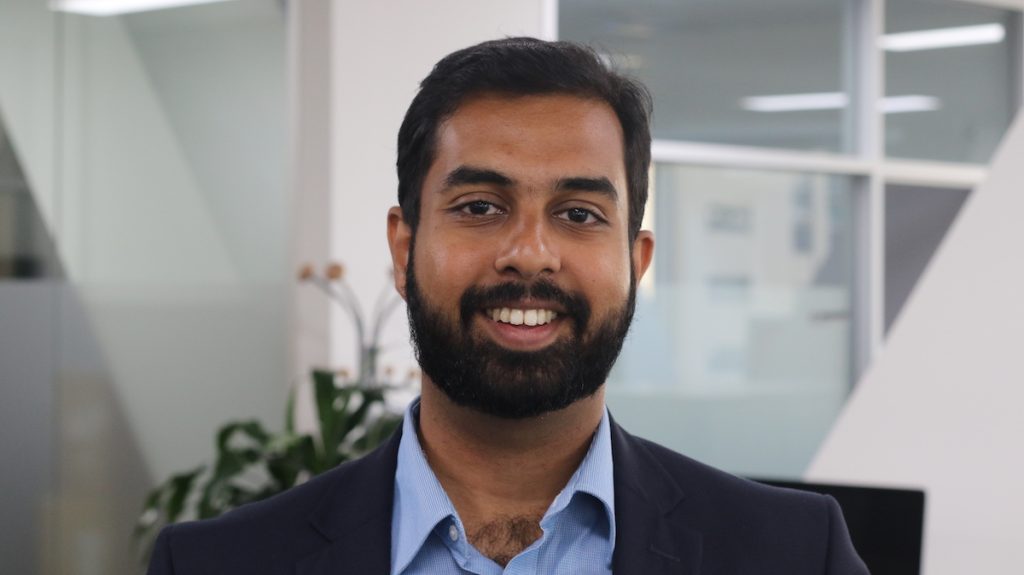Meet Our New Faculty | Balu G Nair
December 11, 2023
We extend a warm welcome to Mr. Balu G Nair who recently joined us as Assistant Professor of Law. He has previously worked as an Associate at the Dispute Resolution teams of AK Law Chambers (Chennai) and Cyril Amarchand Mangaldas (Bangalore), and did a Public Interest Litigation fellowship at IDIA, Bangalore. He also worked for a year with the Supreme Court Observer as an Associate Editor. Prior to joining NLSIU, he was a faculty member at the Jindal Global University.
In this interview, he shares more about his interests, work and personal experiences.
 1. Can you tell us more about yourself/your background?
1. Can you tell us more about yourself/your background?
I spent the first 17 years of my life in Guruvayur, Kerala. I was fortunate to grow up in a household which gave me the freedom to explore many things outside the school curriculum. Evenings were spent with friends on the cricket ground or on a makeshift badminton court. Outside of sports, I was also exposed to a good dose of fiction and non-fiction writing, thanks to the wonderful municipal library nearby. Movies, mainly Malayalam movies, too were a regular feature of my childhood weekends. I think these experiences have had a definitive impact on me. While I no longer get the opportunity to play cricket on a regular basis, I spend an unhealthy amount of time browsing through the sports pages of The Hindu and Cricinfo. Similarly, while I have found it harder and harder to read outside of work (especially now that I have a six month old son), I still try to squeeze in time to read the day’s news, pick up a book or watch a movie.
2. What are your main areas of interest and teaching? How did your interest in these areas begin?
My research and teaching have been mainly focused on Public Law, especially Constitutional Law and Administrative Law. But, I also have an equally keen interest in Tort Law, especially its intersection with Public Law. More narrowly, I have been working on government liability in India, especially in cases of human rights breaches. I have always been fascinated by how the State exerts its power over individuals. I remember an incident from my childhood where a police officer took exception to a member of the public addressing him by his name and insisted on being called ‘Sir’. I think that must have stuck with me and I am curious to find out more about how law can regulate State power, starting with the officers at the ground level.
3. Tell us more about what you are teaching at the University.
I am currently teaching Law of Contracts – I to the first year students of the BA LL.B. (Hons.) programme. Contract Law, at least in the Indian context, provides law students their first serious exposure to the art of reading and interpreting a statute. More importantly, while the subject helps one understand the pre-requisites for a valid bargain in law, a deeper analysis of Contract Law would reveal how the law facilitates a lot of unfair (even if legal) bargains. For instance, most employment contracts (both in the public and private sectors) are standard form contracts, which leave the employee with no option but to sign off on the terms prescribed by the employer. In a world which is witnessing increasing informalisation of the labour force, Contract Law is much more than a device for transactional lawyering and a potential tool for social justice lawyering.
4. Your thoughts on beginning your teaching journey at NLS?
I am excited and nervous in equal measure! Students have been fantastic to interact with. Colleagues too have been extremely welcoming and supportive. While I am still getting used to the rhythms of the trimester system, I am slowly settling in. I am looking forward to teaching some of the core courses that I have taught in my previous university (Jindal), and also to offer an elective on Government Liability in the coming trimesters.
5. One book / podcast / published piece you would recommend to our students and why.
While there are a few books I have in mind, I would like to recommend ‘The Namesake’ by Jhumpa Lahiri. I find that students are often at some sort of crossroads in their search for identity during their university days and this is a book that might resonate with many. I would also recommend the Podcast ‘The Seen and the Unseen’ by Amit Verma for the breadth of the topics covered, and the depth of analysis.
6. Could you highlight some of your key projects or publications (past or current)?
- I am currently working on a paper highlighting the various impediments – constitutional, statutory and otherwise – in enforcing government liability in India (the paper is tentatively titled ‘Suing Governments and their Officers: Making a Case against ‘Good Faith’ and Other Immunities under Indian Law).
- Earlier this year, I co-authored a paper with Prof Farrah Ahmed, titled ‘Administering Indian Citizenship’; the paper looks at the numerous subordinate legislation which make up the Indian citizenship regime and the legal infirmities in them.
- Another paper, which may be of relevance given that the Supreme Court would have pronounced its verdict by the time this interview comes out, is the one on the constitutional validity of the abrogation of Article 370.
To view more of Balu’s publications, view his faculty profile here.

